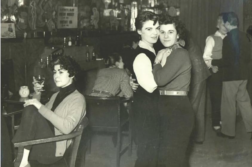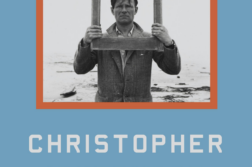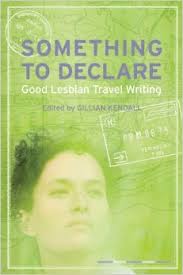 Something to Declare: Good Lesbian Travel Writing
Something to Declare: Good Lesbian Travel Writing
Edited by Gillian Kendall
Wisconsin. 219 pages, $19.95 (paper)
This is an excellent collection of literary travel essays that delve into the transformative possibilities of travel. The editor is a freelance writer who lives in Melbourne, Australia, and the contributors include both well-known and emerging lesbian writers from the U.S. and the UK as well as Australia. The book offers impressionistic narratives that often entail not only the exploration of unknown physical places but also the exploration of unknown places of the soul. Something to Declare is not about the best hotels or restaurants in a locale or a guide to its must-see attractions. The writings tell of personal adventures of self-discovery. Lesléa Newman, in “Bashert,” sensitively narrates the story of a young woman’s sexual and artistic journey of awakening while living and working on a kibbutz in Israel. Lucy Jane Bledsoe, in “Fruits of the Border,” takes us on a wild trip through Tierra del Fuego. Gillian Kendall’s “A Friend in America,” a poignant tale set in an Irish landscape, tells of lost dreams and opportunities for forgiveness. The places visited include a variety of unexpected locations—Italian changing rooms, an ashram, a medieval labyrinth—and a range of memorable experiences, like kayaking down a river, living through a typhoon in Japan, and riding an old Cadillac hearse. Each story is a travelogue that reflects the writer’s personal journey of growth. The great Jewish philosopher Martin Buber once said, “all journeys have secret destinations of which the traveler is unaware.” Gillian Kendall has given us an excellent volume of writings by women trying to gain an awareness of such destinations.
Irene Javors
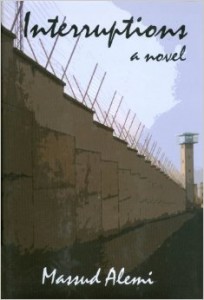 Interruptions: A Novel
Interruptions: A Novel
by Massud Alemi
IBEX Publishers. 304 pages, $25.
In this ambitious and moving novel set in the first years of Iran’s Islamic Revolution of 1979, a young gay man named Farzin finds himself facing charges of treason leveled by zealots of the new Islamic regime. Imprisoned in one of the deposed Shah’s opulent government buildings in Tehran and accused of the capital crime of organizing a protest march, Farzin awakens one morning to the volley of a firing squad outside his cell window. Knowing that he could be the next prisoner removed to the courtyard before dawn, the young man weaves his family history into a defense that he scrawls on paper bags and cigarette wrappers, a practice that continues each morning. His chief inquisitor, a man deeply committed to the Islamic Revolution but also to justice, finds himself eagerly awaiting each successive installment in an Arabian Nights–style twist. Farzin’s defense would be far simpler had he not been arrested in the midst of a protest into which he unwittingly stumbled while en route to a rendezvous with his boyfriend. His truthful alibi would trigger the Ayatollah Khomeini’s interpretation of Islamic law governing homosexuality—the one crime, Farzin suspects, that may be worse than treason. We thus follow an essentially apolitical gay man as he develops the understanding he needs to save his own life and protect the man he loves. In its elucidation of ancient and modern history, Interruptions is rich in suspense and irony. Alongside Persia’s ancient poetry, shimmering pools, and jasmine gardens, we find that the love of men for men has survived the centuries’ succession of despots and zealots. A young man finds himself an accidental revolutionary, and we follow him through periods of panic, resignation, hopelessness, and revelation. Alemi has successfully dramatized a complex political and social history in a compelling novel.
Steve Susoyev
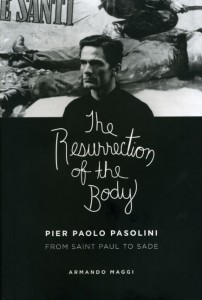 The Resurrection of the Body: Pier Paolo
The Resurrection of the Body: Pier Paolo
Pasolini from Saint Paul to Sade
by Armando Maggi
University of Chicago Press. 424 pages, $49.
In an attempt to define the religious vision of resurrection that follows “metamorphosis, division, doubling, and annihilation” in the final stage of the great Italian filmmaker’s development, Armando Maggi offers excruciatingly detailed readings of the following items: two unproduced and unpublished film scripts, Saint Paul and Porn-Theo-Colossal; an incomplete novel, Petrolio, which only appeared in 1992, some seventeen years after Pasolini’s death; and Salo, the controversial film that featured prominently in the trial of the hustler who murdered the director. Analyzing Pasolini’s complex and troubling images in the context of his reading of such disparate figures as Mircea Eliade, Norman O. Brown, Herbert Marcuse, and Pierre Klossowski (as mediated by Gilles Deleuze), Maggi depicts a Pasolini who was driven to create a religious myth for the post-mythic, capitalistic world; who reacted against the 1960’s Sexual Revolution for openly revealing what previously had been kept hidden; and who saw homosexuality as proof of the Fall of humankind. The denseness and occasional tedium of Maggi’s prose results in part from his need to describe in detail texts not otherwise available to the reader, but more so from Pasolini’s own tortured over-intellectualizing of his need to be “feminized” by the hustlers with whom he consorted. Nonetheless, Maggi succeeds in defining as a religious writer a man whose images of sodomy, coprophilia, and affectless sexual cruelty made him the bane of Italy’s Roman Catholic Church and socialist government.
Raymond-Jean Frontain
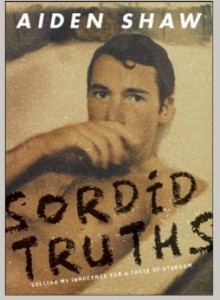 Sordid Truths: Selling My Innocence for a Taste of Stardom
Sordid Truths: Selling My Innocence for a Taste of Stardom
by Aiden Shaw
Alyson. 256 pages, $15.95
In this memoir, self-described “sexual outlaw” Aiden Shaw offers his fans another chance to get inside his head about his body. Shaw, the famous ex-porn star, writes here about his pre-porn life as a drug-fueled hustler. As in his autobiography My Undoing and his novel Brutal Uncut, Shaw describes his experiences in naked detail. Among them is his first time with a client, who tells him, “Listen, honey, you have the dick of death. … It’ll be the making of you. Mark my words.” If one believes everything he says, Shaw is a “good kid” who prides himself on making others, however strange or insecure, feel good about themselves. And he never really runs into any danger on the job. Even when cops bust and strip him on a possible drug charge, he comes off naughty but clean. Some of his more interesting clients are a man in a wheelchair and an aging musical theatre legend with a taste for young flesh. Shaw asks both gentlemen for their advice on a screenplay he’s written, and we learn how the author wins his clients’ trust by stroking their fragile egos along with their bodies. It’s an unsurprising lesson about the escort business and as telling as any detail Shaw provides about being naked, getting hard, or having sex on demand. The chapters about working at the Burlington and, later, Clinique, two massage parlor/brothels, demystify the daily grind of the sex industry: the pressure to get “extras” from clients, the camaraderie and/or in-fighting among the staff. Shaw comes to life when recounting the sex sessions, such as one with a client—a man of the cloth, no less—who gets off by watching two men together. The book’s purple prose passages—such as a shower scene that provides Shaw with masturbation fantasies—will certainly stimulate readers more than his descriptions of getting high or longing for love. Shaw’s self-assessment is candid, and readers who want to know what makes him tick will come away satisfied.
Gary M. Kramer
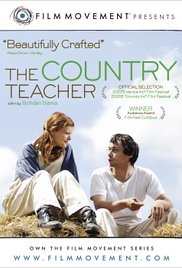 The Country Teacher (Venkovsky Ucitel)
The Country Teacher (Venkovsky Ucitel)
Written and directed by Bohdan Slama
This Czech film is the story of Petr, a young gay teacher who flees his lover and the urban setting of Prague for the peace and quiet of a country village. The headmaster of his new school suspects he’s running from something but doesn’t force the issue. A local widow quickly falls in love with the new teacher from the city, but when her overtures are ignored she suspects it’s because she’s too old. The reason is a hot seventeen-year-old that Peter is tutoring at her request. This film is Lolita in reverse. Instead of a corrupt female child, we get an innocent if brash seventeen-year-old boy. Instead of Lolita’s guilt-ridden Humbert Humbert, ready to do anything to get his prize, we have a teacher who’s filled with ideals and hesitations, consumed as much by love as by lust. The arrival of Petr’s ex-lover destroys the peace and quiet. When Petr refuses to renew their relationship and spurns his advances, the lover plots revenge. What follows is a strange chain of events involving the lover, the boy’s girlfriend, Petr’s advances, and the first of two graphic yet symbolic births of a calf. Not to give away the ending, there are painful scenes, anguish, and great soul searching in the second half of the film. The characters reveal their complexity, shame, and humanity in a way that’s frankly unimaginable in the U.S. today. If the story line stretches belief, the sensual cinematography, the often meditative pace, and the superb acting give the viewer plenty to ponder. The ethical dilemmas are both disturbing and fascinating. This film won the Best Queer Film Prize at the Reykjavík Film Festival in Iceland.
Jack Miller




